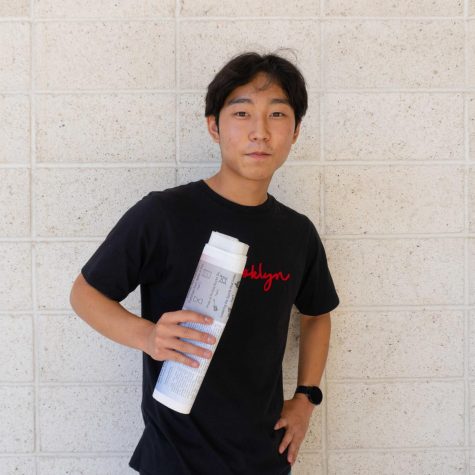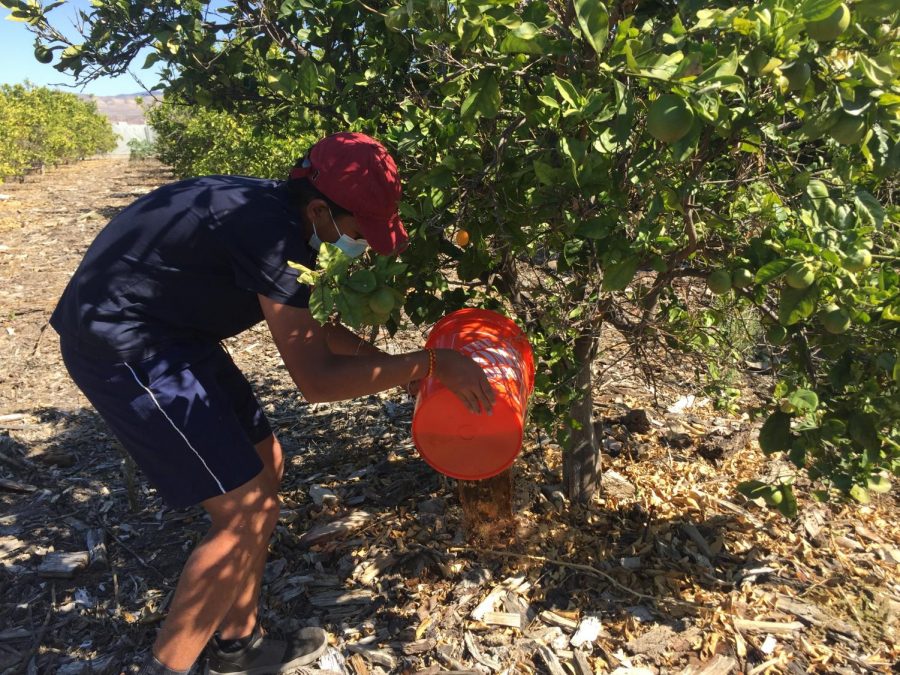The Farm and Food Lab Club Cultivates Passion for Farming
Photo courtesy of Shrinikesh Borsune
Freshman Mourya Nunna applies fertilizer to an orange tree while volunteering at Farm and Food Lab on Oct. 6. Farm and Food Lab club members bond and cooperate under the supervision of executive director of Farm and Food Lab at Great Park Nathan Gipple.
Baseball caps on, a garden hose to their left and buckets of fertilizer to their right, freshmen plod back to the rows of orange trees, squinting from the sunshine.
The Farm and Food Lab Club holds monthly volunteer events at the Orange County Great Park Farm and Food Lab. During volunteer work, students raise crops for Second Harvest Food Bank with different roles designed for students from cutting weeds to mixing fertilizers. The club also creates opportunities to grow small plants such as California poppies individually, integrating gardening in students’ lifestyles.
Club president and freshman Shrinikesh Borsune founded the club with his friends to foster passion for growing plants at Farm and Food Lab, where he has been working since this summer. The City of Irvine runs the Farm and Food Lab, which allows for the community to have a closer look at local agriculture and gain practical knowledge about growing food in urban environments.
“Ever since I was little, I had a strong interest in growing plants. It seems magical how they just grow,” Borsune said. “When I visited the Farm and Food Lab, I couldn’t take my eyes off of all kinds of plants there. Wow, this is cool. I want to do it someday. So, I thought, why not bring this to Portola?”
Farm and Food Lab executive director Nathan Gipple said he believes that the next generation should understand where and how our food is produced, and he appreciates his effort to encourage others to participate in the volunteer work.
“I think it is absolutely essential that the young population in the community understands where food comes from, the hard work that goes into producing it and the absolute ability they have to produce their own food.” Gipple said.
Science teacher and club adviser Courtney Moder highlighted how the club’s work helps students easily develop the environmental science concepts: as they experience and engage with the plants directly, students learn essential scientific concepts. To her, students do not simply experience farming but also experiment with soil and plants through mistakes and adjustments.
“The club is at the heart of everything in environmental science,” Moder said. “When you are trying to grow plants, and you are looking at farming, too, you are also trying to think about what ways we can make that sustainable, and I think that in all different classes you can take in the campus, you can find something that would relate to what that club is doing in terms of growing food.”
The Farm and Food Lab club meets at lunch the first week of every month in room 804. If you are interested, visit the links below.
https://sites.google.com/iusd.org/farmandfoosdlabclubphs/home
Your donation will support the student journalists of Portola High School. Your contribution will allow us to purchase equipment and cover our annual website hosting costs.

Martin Yoon is a first year staff writer in portola pilot. Although he is a senior seemingly busy with college apps and more, he is passionate about Journalism...




